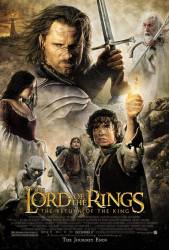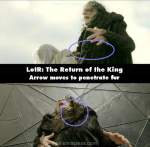Question: This question is sort of across the whole trilogy: If the elves are immortal (or, as I think someone pointed out, they just age very very slowly) but they still have children, (various elf family trees confirm this), how is it that Middle Earth isn't overrun by them?
Question: Is there any indication that we will see Sam put the Ring on to hide at Cirith Ungol, as he does in the book, in the extended version?
Answer: It would appear to be unlikely. The way that they dealt with Sam taking the ring it would appear that they wanted to let the audience think that the orcs actually had taken the ring from Frodo, not that Sam had it. If they were to show Sam using the ring, that whole thing would be undermined.
Question: What is Sauron's army chanting as they approach Minas Tirith? Not the Grond bit, earlier than that. It sounds like four syllables being repeated.
Answer: It is just an orc war chant. I'm not sure that anybody knows quite what it means.
Question: Is there a reason that Gollum's fingers-per hand constantly appears to change from six to five? I know that I am not seeing things, but one of the corrections says that this would never happen.
Answer: Given how Gollum was created, his fingers certainly should remain consistent throughout the films, and it's highly implausible that the SFX people would arbitrarily introduce another finger for certain scenes - it could serve no possible purpose and would detract from the reality of the character. The most likely conclusion is that the apparent change is illusionary - you yourself say that it 'appears to change', which lends itself strongly towards illusion as a possible reason. That being said, errors in rendering the character could result in such an error occuring, although it's an awfully specific thing to happen - rendering errors are usually much more random in nature - and it's surprising, considering the attention to detail required for such an important character, that nobody in the SFX department picked up on it, particularly if it happens on several occasions.
Question: When Frodo, Sam and Gollum reach Minas Morgul (The dead city), a massive green and white tower of light comes out of the city. (It frightens Gandalf, Pippin and the Gondorians back at Minas Tirith). What is it for exactly?
Answer: In the book, this happens in response to a similar signal (albeit red) from deep within Mordor (probably from Barad-Dur) - it seems to be a rather dramatic signal for the armies of Mordor to advance. In the book, Sauron's forces make multiple assaults - both Lothlorien and the dwarven kingdom of Erebor (in the north) come under attack - so a powerful signal, visible for great distances, would be required to ensure a simultaneous assault. Although the Barad-Dur signal is not seen in the film, the Morgul flare can still serve the same purpose of signalling the advance on Gondor. Plus, as you observe, it has the handy side-effect of scaring the hell out of the Gondorian forces - Sauron is a master of manipulation and psychology, so it's exactly the sort of thing he'd do.
Question: At the moment of Theoden's death, the last thing he says to Eowyn is 'I go to my fathers, in whose mighty company I shall now not feel ashamed. Eowyn...' What exactly is he ashamed of?
Question: Is there evidence that Peter Jackson was influenced by the 1996 PC game "Warcraft II" in how the soldiers of Gondor and the Orcs dress? The armored uniforms of the Gondorians resembled those of the humans in Warcraft.
Chosen answer: For practical armouring, there are only so many possibilities that you can go with - inevitably some of these will resemble each other. The Gondorian armour is described to a reasonable degree within the books - the designs would have been based on those descriptions, rather than any non-Tolkien influences.
Question: Are there any Easter Eggs on the normal (not extended) DVDs of any of the three films?
Answer: No. All of the easter eggs are on the extended edition of the films.
Question: I know the first film had dialogue references to chapters of the book, such as "A Shortcut to Mushrooms" and "A Long Expected Party". Did this film have any such references?
Answer: Nothing so precise. Like the Two Towers, the chapter headings in the Return of the King tend more to the simple, like "The Siege of Gondor", "Minas Tirith", or "Mount Doom". These do come up in dialogue, obviously, but can't really be considered as references to the chapter titles in the same way as with the Fellowship of the Ring.
Question: Lord Denethor is not the king of Gondor, but a steward, a caretaker of the throne according to Gandalf. Does this means that he is acting as a regent?
Chosen answer: Effectively, yes - the Stewards rule in the absence of the rightful King of Gondor. That being said, the Stewards have now ruled Gondor for 26 generations of their family and believe the bloodline of the King to be destroyed, so, as we see with Denethor, they pretty much consider themselves to be the true rulers of the kingdom these days. As such, while they are technically fulfilling the role of regent, they might not actually consider that to be the case any more.
Question: What is the difference from Hobbiton and The Shire? Is The Shire a village, and Hobbiton the region where the Hobbits live?
Chosen answer: Actually, it's the other way around. The region is called Shire, the village Hobbiton. There are several other villages in the Shire, for example Buckland.
Question: Why didn't Gandalf get Gwaihir the wind lord (The giant eagle) to ride Frodo to Mount Doom? It would have saved the heroes from fighting, saved some of them from dying, and would have especially saved Rohan and Gondor from the near destruction they suffered.
Answer: They had to do this in secret. If they were to just fly into mordor on a giant eagle, they would attract the full attention of sauron, the nazgul, and all of sauron's army.
Question: During The Ride of the Rohirrim, after Gothmog (Pink Orc Captain) shouts "Fire at will", you can see a black haired and black bearded rider wearing a suit of chainmail with a long axe in the front of the shot (only for a second or so) I think this is Peter Jackson but I am not sure, does anybody know?
Answer: I can see who you mean, but I'm pretty certain that it's not Peter Jackson - the resemblance isn't really that close. Besides, I strongly suspect that the studio would be dead set against anything that put their director (scriptwriter/producer/etc) on a horse in the middle of a charge - I've never read anything to indicate that Jackson is an experienced rider, and there are risks in what's being portrayed in that scene.
Question: Do the head orc with the skin over his eyes and the orc with the skulls pile on top of his head have names?
Answer: The lead orc is Gothmog, a briefly mentioned character in the books (mentioned precisely once) - it's not even clear in the books which race he belongs to. The second orc, with the skulls, doesn't seem to have a name.
Question: How does Smeagol over time becomes the hideous-looking Gollum? Did the One Ring radically changed his appearance? Also, what kind of Hobbit was Smeagol?
Chosen answer: Smeagol was believed to have been a Stoor, a branch of the hobbits known for being quite large and strong (by hobbit standards). His mutation is because of the Ring - precise reason unclear, but almost certainly related to the fact that it has prolonged his life far beyond a normal hobbit span (Gollum is around 580 years old when he dies, easily five times the normal lifespan)- note that Bilbo, who, while old, is still within a normal hobbit lifespan, looks physically normal. Smeagol, through use of the Ring, has been influenced by the wraithworld, in exactly the same manner that the kings of men who were given the nine rings ultimately became the Nazgul - in time, he would presumably have become a wraith-like being like them. Gollum's current appearance may be some intermediate stage.
Question: In theaters, some film reels have subtitles for the scene where Elrond gives Anduril to Aragorn and they say a couple elvish lines - "Onen i-Estel Edain. U-chebin estel anim." - and other film reels do not have subtitles for the elvish. I am wondering what the reason for this would be.
Answer: I encountered this when I saw FOTR the first time in theaters. What happened is that the projector was aimed down too far on the screeen, effectively cutting off the subtitles. They are there on all of the prints, but due to bad projector setup in some theaters, many people didn't get to see these.
Question: This actually applies on all three films. I'd like to know the font used in the the title sequences at the beginning of each movies which is the one used in "New Line Cinema presents...." and "The Lord of the Rings". (I'm not referring to the one used in the official logo which is "Ring bearer" or "Tolkien".)
Answer: The font used is a variation of the Elvish writing style, in English. Thus it is not available and was probable just made for the production. A good elvish font, if you want that style, is called Tengwar.








Answer: Elves aren't prone to churning out the kids - they breed very infrequently. Elrond, who's been around for six thousand years, has only had three children in that time period. Galadriel and Celeborn, whose marriage dates back even further than that, have only had one (Celebrian, Elrond's wife). While elf lifespans are sufficiently long that they can be considered effectively immortal, they do die in accidents or wars. Plus others (including the aforementioned Celebrian) have gone into the West. Put all that together, and it does a good job of keeping the elven population of Middle-Earth down to reasonable levels.
Tailkinker ★